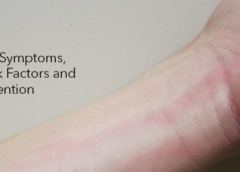What is Typhus?
Typhus is a condition caused by one or more rickettsial bacteria developing an infection. It transmits fleas, mites (chiggers), lice, or ticks when they bite you. Fleas, mites, lice, and ticks are forms of arthropods known as invertebrate animals. When somebody is bite by arthropods carrying rickettsial bacteria, they transmit the bacteria which cause typhus. Scratching the bite further exposes the skin and provides further exposure to the blood stream for the bacteria. Once in the bloodstream, the bacteria continue to reproduce and grow.
There are three different types of typhus:
- Epidemic (Louse-Borne) Typhus
- Endemic (Murine) Typhus
- Scrub Typhus
The type of typhus that you become infected with depends on what bit you are infected with. Arthropods typically carry a typhus strain which is unique to their species.
Typhus outbreaks usually occur only in developing countries or in areas of poverty, poor sanitation and close contact with humans. Typhus is usually not problem in the United States, but when traveling abroad you can become infected.
Untreated typhus can cause severe complications and it can be fatal. If you think you might have typhus it is necessary to see your doctor.
Symptoms
Symptoms start, in most cases, within 1 to 2 weeks of exposure to an infected insect. This can make the original source of the infection hard to track.
The symptoms of typhus include:
- Headache
- Cough
- Nausea and Vomiting
- Skin Rash
- Symptoms Similar to Flu, Like Fever, Chills, And Muscle Aches
- Confusion
- Rapid Breathing
Different types of typhus also cause specific symptoms. People with scrub typhus may find on the skin a dark scab or bite, and may develop swollen lymph nodes. People with murine typhus may be losing appetite.
For some people, particularly those with poor immune systems, typhus symptoms reappear months after the initial infection, or even years after. Doctors refer to this disease as Brill-Zinsser. A person who has typhus symptoms after an earlier infection should advise their doctor.
When to see a doctor
If you think you have typhoid fever see a doctor immediately. If you’re from the US and get ill when traveling abroad, call the US. Consulate for a Physicians Chart. Better yet, find out in advance about medical care in the areas you are going to visit and include a list of recommended doctors’ names, addresses and phone numbers.
If after you return home you experience signs and symptoms, consider seeing a doctor who is based on foreign travel medicine or infectious diseases. A specialist can identify and treat your disease faster than a physician who is not familiar with these areas can.
Causes
When they bite you, insects and other parasites transmit murine and epidemic typhus, and leave bacteria-laden feces on your skin.
You can spread the infested feces into the open bite wound or other cuttings on the surface of your skin when scratching the itching bug bite. That deposits bacteria from the typhus into your bloodstream.
If a mite infected with the bacterium bites you, even if you are not scratching the mark, you may get scrub typhus.
Risk factors
Risk factors for typhus include residing or visiting areas where the disease is endemic. These include several port cities with large rat populations, and areas with low levels of waste and low hygiene. The major threats are disaster zones, homeless camps, poverty-stricken areas and other similar circumstances that allow rodents to come in close contact with people. These are the same kinds of conditions that lead to cholera, tuberculosis and viral diseases such as influenza outbreaks. Fleas (and ticks) are most prevalent in spring and summer months, but infections can occur any time of year.
Treatment
Doctors prescribe antibiotic for endemic and epidemic typhus infections because early antibiotic treatment (e.g., azithromycin, doxycycline, tetracycline, or chloramphenicol) will heal most people with the bacteria. Consultation with an expert on infectious disease is advisable, particularly if there is diagnosis of epidemic typhus or typhus in pregnant women. Treatment delays can cause problems in the renal, lung, or nervous system to develop. Many patients can die, especially the elderly ones.
Complications
Some complications of typhus include:
- Hepatitis, which is inflammation of the liver
- Gastrointestinal hemorrhage, that is bleeding into the intestines
- Hypovolemia, the reduce in the volume of blood fluid
Prevention
A vaccine was developed during World War II for the prevention of epidemic typhus. However, the shrinking number of cases has stopped the manufacture of the vaccine. The easiest way to avoid typhus is to avoid the pests that transmit it.
Suggestions for prevention include:
- Maintain a proper personal hygiene (helps protect against disease carrying lice)
- Controlling the rodent population (rodents are known to carry arthropods)
- Avoid travel to regions where exposure to typhus has occurred, or to countries at high risk due to lack of sanitation
- Chemoprophylaxis with doxycycline (used as a preventive measure only for those at high risk, such as those involving humanitarian efforts in areas of extreme deprivation and with little or no sanitation)
Use tick, mite, and insect repellant. Perform regular tick tests, and wear protective clothing while you are traveling to an area where typhus outbreaks have occurred.

Leave a Reply
You must be logged in to post a comment.